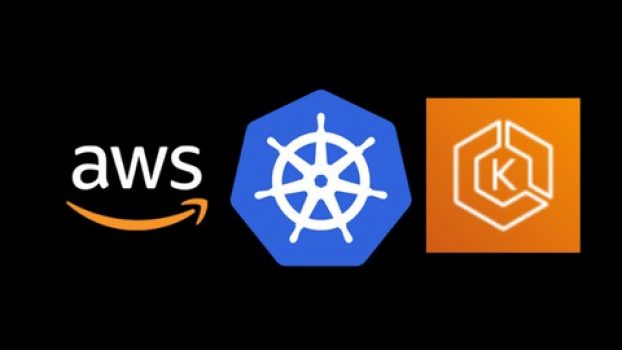Docker, EBS, RDS, CLB, NLB, ALB, Fargate, ECR, CloudWatch, Route53, Certificate Manager, X-Ray, Ingress, Autoscaling,SNS
Instructed by Kalyan Reddy Daida 26.5 hours on-demand video & 7 articles
What you’ll learn
-
You will write kubernetes manifests with confidence after going through live template writing sections
-
You will learn 30+ kubernetes concepts and use 18 AWS Services in combination with EKS
-
You will learn Kubernetes Fundamentals in both imperative and declarative approaches
-
You will learn writing & deploying k8s manifests for storage concepts like storage class, persistent volume claim pvc, mysql and EBS CSI Driver
-
You will learn to switch from native EBS Storage to RDS Database using k8s external name service
-
You will learn writing and deploying load balancer k8s manifests for Classic and Network load balancers
-
You will learn writing ingress k8s manifests by enabling features like context path based routing, SSL, SSL Redirect and External DNS.
-
You will learn writing k8s manifests for advanced fargate profiles and do mixed mode workload deployments in both EC2 and Fargate Serverless
-
You will learn using ECR – Elastic Container Registry in combination with EKS.
-
You will implement DevOps concepts with AWS Code Services like CodeCommit, CodeBuild and CodePipeline
-
You will implement microservices core cocepts like Service Discovery, Distributed Tracing using X-Ray and Canary Deployments
-
You will learn to enable Autoscaling features like HPA,VPA and Cluster Autoscaler
-
You will learn to enable monitoring and logging for EKS cluster and workloads in cluster using CloudWatch Container Insights
-
You will learn Docker fundamentals by implementing usecases like download image from Docker Hub and run on local desktop and build an image locally, test and push to Docker Hub.
-
You will slowly start by learning Docker Fundamentals and move on to Kubenetes.
-
You will master many kubectl commands over the process
Course Modules
- Create AWS EKS Cluster using eksctl CLI
- Docker Fundamentals
- Kubernetes Fundamentals (Pods, ReplicaSets, Deployments & Services)
- EKS Storage with AWS EBS CSI Driver
- Kubernetes Important Concepts for Application Deployments
- Kubernetes – Secrets
- Kubernetes – Init Containers
- Kubernetes – Liveness & Readiness Probes
- Kubernetes – Requests & Limits
- Kubernetes – Namespaces, Limit Range and Resource Quota
- EKS Storage with AWS RDS MySQL Database
- Load Balancing using CLB & NLB
- Load Balancing using CLB – AWS Classic Load Balancer
- Load Balancing using NLB – AWS Network Load Balancer
- Load Balancing using ALB – AWS Application Load Balancer
- ALB Ingress Controller – Install
- ALB Ingress – Basics
- ALB Ingress – Context path-based routing
- ALB Ingress – SSL
- ALB Ingress – SSL Redirect HTTP to HTTPS
- ALB Ingress – External DNS
- Deploy Kubernetes workloads on AWS Fargate Serverless
- AWS Fargate Profiles – Basic
- AWS Fargate Profiles – Advanced using YAML
- Build and Push Container to AWS ECR and use that in EKS
- DevOps with AWS Developer Tools CodeCommit, CodeBuild and CodePipeline
- Microservices Deployment on EKS – Service Discovery
- Microservices Distributed Tracing using AWS X-Ray
- Microservices Canary Deployments
- EKS HPA – Horizontal Pod Autosaler
- EKS VPA – Vertical Pod Autosaler
- EKS CA – Cluster Autosaler
- EKS Monitoring using CloudWatch Agent & Fluentd – Container Insights
AWS Services Covered
- AWS EKS – Elastic Kubernetes Service
- AWS EBS – Elastic Block Store
- AWS RDS – Relational Database Service MySQL
- AWS CLB – Classic Load Balancer
- AWS NLB – Network Load Balancer
- AWS ALB – Application Load Balancer
- AWS Fargate – Serverless
- AWS ECR – Elastic Container Registry
- AWS Developer Tool – CodeCommit
- AWS Developer Tool – CodeBuild
- AWS Developer Tool – CodePipeline
- AWS X-Ray
- AWS CloudWatch – Container Insights
- AWS CloudWatch – Log Groups & Log Insights
- AWS CloudWatch – Alarms
- AWS Route53
- AWS Certificate Manager
- EKS CLI – eksctl
- AWS SNS – Simple Notification Service
Kubernetes Concepts Covered
- Kubernetes Architecture
- Pods
- ReplicaSets
- Deployments
- Services – Node Port Service
- Services – Cluster IP Service
- Services – External Name Service
- Services – Load Balancers
- Services – Ingress Service
- Services – Ingress SSL & SSL Redirect
- Services – Ingress & External DNS
- Imperative – with kubectl
- Declarative – Declarative with YAML
- Secrets
- Init Containers
- Liveness & Readiness Probes
- Requests & Limits
- Namespaces – Imperative
- Namespaces – Limit Range
- Namespaces – Resource Quota
- Storage Classes
- Persistent Volumes
- Persistent Volume Claims
- Annotations
- Canary Deployments
- HPA – Horizontal Pod Autoscaler
- VPA – Vertical Pod Autoscaler
- CA – Cluster Autoscaler
- DaemonSets
- DaemonSets – Fluentd for logs
- Config Maps
Recommended Courses
Deal Score+2
Disclosure: This post may contain affiliate links and we may get small commission if you make a purchase. Read more about Affiliate disclosure here.


